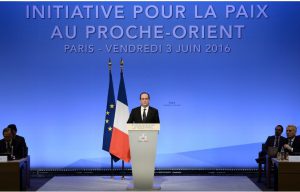DISARMAMENT AND SECURITY .
An article by The Elders
The Elders welcome the international conference being convened in Paris on 3 June by the French Government, aimed at reviving efforts to end the Israeli-Palestinian conflict.

French President Hollande speaks to the Paris conference. Photo from AFP/Stephane de Sakutin, Pool.
Click on photo to enlarge
The last 18 months have seen worsening violence, a hardening of political rhetoric and a diplomatic impasse. The international community must push decisively to shift the dynamics on the ground and secure lasting peace for Israelis and Palestinians alike. A two-state solution that respects international law, addresses legitimate security concerns and upholds human rights remains the only way forward.
Kofi Annan, Chair of The Elders, said:
“This conference is an opportunity to revitalise international engagement on the Israeli-Palestinian conflict. After so many decades of conflict, people deserve to live in peace and dignity. This requires an end to occupation, and self-determination for the Palestinian people. The Elders call on all those involved to work constructively and in good faith towards this goal.”
The Elders note the conflicts raging in much of the wider Middle East and argue this makes it even more important that diplomatic efforts for a two-state solution are intensified.
Jimmy Carter, former President of the United States and Honorary Elder, said:
“The world cannot afford to forget about the Israeli-Palestinian conflict. Palestinians continue to be denied justice and human rights, and their leaders remain divided and disengaged from the search for lasting peace. This stokes resentment and support for extremism across the region. Equally, Israelis are ill-served by a government that promotes illegal settlements and flouts international law.”
(See right column for Final Communique)
Presenting the Palestinian side of the Middle East, Is it important for a culture of peace?
How can a culture of peace be established in the Middle East?
(continued from left column)
[Editor’s note: The final communique from the summit includes an urgent call for a two-state solution, as demanded by the Elders and by the the Arab Peace Initiative.]:
“The Participants met in Paris on June 3, 2016 to reaffirm their support for a just, lasting and comprehensive solution to the Israeli-Palestinian conflict.
“They reaffirmed that a negotiated two-state solution is the only way to achieve an enduring peace, with two states, Israel and Palestine, living side by side in peace and security. They are alarmed that actions on the ground, in particular continued acts of violence and ongoing settlement activity, are dangerously imperiling the prospects for a two-state solution.
“The Participants underscored that the status quo is not sustainable, and stressed the importance of both sides demonstrating, with policies and actions, a genuine commitment to the two-state solution in order to rebuild trust and create the conditions for fully ending the Israeli occupation that began in 1967 and resolving all permanent status issues through direct negotiations based on resolutions 242 (1967), 338 (1973), and also recalling relevant United Nations Security Council resolutions and highlighting the importance of the implementation of the Arab Peace Initiative.
“The Participants discussed possible ways in which the international community could help advance the prospects for peace, including by providing meaningful incentives to the parties to make peace. The Participants also highlighted the potential for regional peace and security as envisioned by the Arab Peace Initiative.
“The Participants highlighted the key role of the Quartet and key regional stakeholders. They welcomed the interested countries’ offer to contribute to this effort. They also welcomed France’s offer to coordinate it, and the prospect of convening before the end of the year an international conference.”